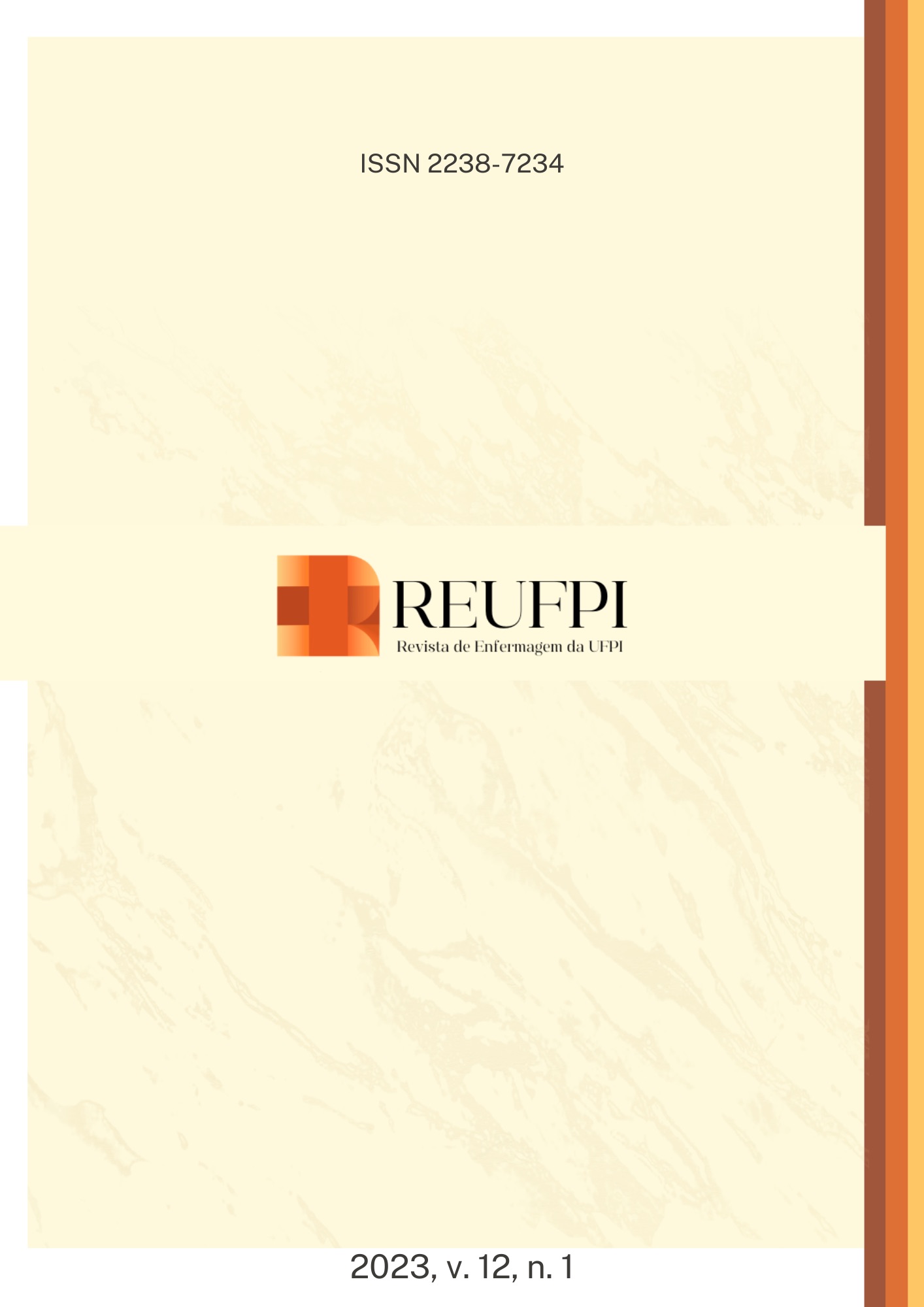Perspectives of being a female informal caregiver of children with disabilities
DOI:
https://doi.org/10.26694/reufpi.v12i1.4436Palavras-chave:
Caregivers, Disabled Children, Qualitative ResearchResumo
Objective: To know the perspective of being a female informal caregiver of children with disabilities. Methods: A descriptive, exploratory and qualitative study. The participants were female informal caregivers of children with disabilities. Data collection took place through four virtual focus groups, via the Google Meet platform. The analysis was carried out by means of Thematic Content Analysis. The criterion for categorization was semantic. The categories that emerged were named in the light of the relevant scientific literature. Results: Three categories emerged after analyzing the focus groups, namely: Category 1 - Peers as support network; Category 2 - The spirituality experience; and Category 3 - Concerns about social and legal aspects. Conclusion: The perspective of being a female informal caregiver of children with disabilities involves a negative and positive aspect. Negative, in the sense that there is dissatisfaction through the judgments imputed by society in relation to them and the legal framework that governs their rights. Positive, through the support network comprised by other mothers of children with disabilities and the spirituality experience in the care context, making the care routine smoother.
Referências
Brasil. Lei Nº 13.146, de 6 de julho de 2015. Lei Brasileira de Inclusão da Pessoa com Deficiência (Estatuto da Pessoa com Deficiência). [Internet] Diário Oficial da União: Brasília, DF, 2015. Available from: https://www.planalto.gov.br/ccivil_03/_ato2015-2018/2015/lei/l13146.htm
UNICEF. Seen, Counted, Included: Using data to shed light on the well-being of children with disabilities [internet]. 2022. Available from: https://data.unicef.org/resources/children-with-disabilities-report-2021/
Instituto Brasileiro de Geografia e Estatística (BR). Censo Demográfico [Internet]. Brasília, 2010. Available from: https://www.ibge.gov.br/estatisticas/sociais/populacao/9662-censo-demografico-2010.html?=&t=destaques
Melo APL, Lyra TM, Barbosa JMV, Araújo TVB. Congenital zika syndrome and family impacts: an integrative review. Ciência & Saúde Coletiva [Internet]. 2023;28(05):1425-1441. DOI: 10.1590/1413-81232023285.14852022
Friedemann ML, Buckwalter KC. Family Caregiver Role and Burden Related to Gender and Family Relationships. J Fam Nurs. [Internet]. 2014;20(3):313-336. DOI: https://doi.org/10.1177/1074840714532715
Weiss P, Hadas-Lidor N, Sachs D. Participação de cuidadores familiares na recuperação/comunicação da cognição com base na intervenção cognitiva dinâmica. In: KATZ N. Neurociência, reabilitação cognitiva e modelos de intervenção em terapia ocupacional. 3a ed. São Paulo: Santos; 2014. p.67-86.
Tong A, Sainsbury P, Craig J. Consolidated criteria for reporting qualitative research (COREQ): a 32-item checklist for interviews and focus groups. Int. j. qual. health care. [Internet]. 2007;19(6):349-57. DOI: http://doi.org/10.1093/intqhc/mzm042
Aschidamini IM, Saupe R. Grupo focal estratégia metodológica qualitativa: um ensaio teórico. Cogitare Enfermagem. [Internet] 2004; 9(1):9-14. Available from: https://revistas.ufpr.br/cogitare/article/viewFile/1700/1408.
Bardin L. Análise de Conteúdo. 1ª ed. São Paulo: Edições 70; 2016.
Ministério da Saúde (BR). Conselho Nacional de Saúde. Resolução n. 466, de 12 de dezembro de 2012. Diretrizes e normas regulamentadoras de pesquisas envolvendo seres humanos. [Internet] Brasília: CNS, 2012b. Available from: http://www.conselho.saude.gov.br/web_comissoes/conep/index.html.
Figueiredo MC, Haas AN, Silva AM, Furtado TC. Profile, feelings and quality of life of caregivers of patients with disabilities attended at the Dentistry College of the Federal University of Rio Grande do Sul: caregivers of patients with disabilities with the word. RFO UPF. 2019;24(3):378-386. DOI: http://dx.doi.org/10.5335/rfo.v24i3.9941.
Ferreira DF, Ahnerth NMS, Batista EC. Sentidos de ser mulher cuidadora de um familiar com transtorno mental grave na região Amazônica. Aletheia. 2019;52( 2 ): 36-51. Available from: http://pepsic.bvsalud.org/scielo.php?script=sci_arttext&pid=S1413-03942019000200004&lng=pt.
Santos MRG, Miranda JJ, Belo FRR. Idealizações e Prescrições Psicanalíticas acerca da Maternidade em Chodorow: um Debate Atual. Psicologia: Ciência e Profissão. 2020;40:e189015, p.1-14. DOI: https://doi.org/10.1590/1982-3703003189015.
Pereira LC, Tsallis AC. Maternidade versus sacrifício: uma análise do efeito moral e práticas sobre a maternidade, comumente engendradas nos corpos das mulheres. Pesquisas e Práticas Psicossociais. [Internet]. 2020;15(3):e-3651. Available from: http://pepsic.bvsalud.org/pdf/ppp/v15n3/08.pdf.
Brito RC, Koller SH. Desenvolvimento humano e redes de apoio social e afetivo. In: Carvalho, AM (org.). O mundo social da criança: natureza e cultura em ação. 1a ed. São Paulo: Casa do Psicólogo; 1999.
Carlsson T, Mattsson E. Peer Support Experienced by Mothers of Children With Congenital Heart Defects in Sweden. J Fam Nurs. [Internet]. 2022;28(2):1-9. DOI: https://doi.org/10.1177/10748407211067788
Watson E. The mechanisms underpinning peer support: a literature review. J Ment Health. [Internet]. 2019;28(6):677-88. DOI: https://doi.org/10.1080/096382 37.2017.1417559
Leite ACAB, García-Vivar C, De Montigny F, Nascimento LC. Waves of family hope: narratives of families in the context of pediatric chronic illness. Rev. Latino-Am. Enfermagem. [Internet]. 2021;29:e3504. DOI: https://doi. org/10.1590/1518-8345.5515.3504
Nascimento EMA, Rodrigues MSD, Evangelista CB, Cruz RAO, Lordão AV, Batista PSS. Emotional stress between informal caregivers of patients in palliative care. doi: Rev enferm UERJ. [Internet]. 2021; 29:e61132. DOI: http://dx.doi.org/10.12957/reuerj.2021.61132
Catão MO. Genealogia do direito à saúde: uma reconstrução de saberes e práticas na modernidade. 1a Ed. Campina Grande: EDUEPB [Internet]; 2011. DOI: https://doi.org/10.7476/9788578791919
Supriati L, Sudiana IK, Nihayati HE, Rodli M, Kapti RE. Patient and illness factors influencing fear of recurrence in breast cancer women. J Pak Med Assoc. [Internet]. 2023;73(Suppl2)(2):S26-S29. DOI: https://doi.org/10.47391/JPMA.Ind-S2-6
Lopes Júnior W, Paiva EMC, Cardoso ABA, Costa ICP, Ferreira EB, Bressan VR, et al. Religiosity/spirituality among the brazilian population in the face of the Covid-19 pandemic and the correlation with quality of life. Arq. ciências saúde UNIPAR. [Internet]. 2023;27(2): 948-966. DOI: https://doi.org/10.25110/arqsaude.v27i2.2023-024
Leininger MM. Culture care diversityand universality. 3a Ed. New York: National Leangue for Nursing; 2015.
Magagnin AB, Heidemann ITSB. Empowerment of family caregiver in front of stroke in hospital environment. Revista Brasileira de Enfermagem. [Internet]. 2020;73(4):e20190165. DOI: http://dx.doi.org/10.1590/0034-7167-2019-0165.
Souza JM. The practical applicability of empowerment in health promotion strategies. Ciência & Saúde Coletiva. [Internet]. 2014;19(7):2265-76. DOI: https://doi.org/10.1590/1413-81232014197.10272013.
World Health Organization (WHO). Ottawa Charter For Health Promotion. Ottawa: World Health Organization/Health and Welfare Canada/Canada Public Health Association, 1986.
Downloads
Publicado
Como Citar
Edição
Seção
Licença
Copyright (c) 2023 Rev Enferm UFPI

Este trabalho está licenciado sob uma licença Creative Commons Attribution 4.0 International License.
Autores mantém os direitos autorais e concedem à REUFPI o direito de primeira publicação, com o trabalho licenciado sob a Licença Creative Commons Attibution BY 4.0 que permite o compartilhamento do trabalho com reconhecimento da autoria e publicação inicial nesta revista.

























